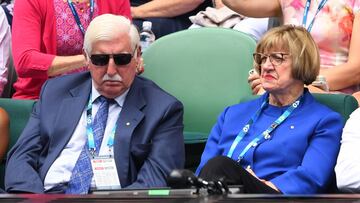Is tennis great Margaret Court the victim of ‘cancel culture’ and if so is it justified?’
With her now infamous views on homosexuality and South Africa’s previous racial segregation well documented, the Australian legend didn’t back down when speaking about Williams recently.


Shots were fired, in a recent interview with Australian tennis legend Margaret Court, as she took aim at present-day icon Serena Williams. The bigger question that remains, however, is does she have a point about why she’s been shunned?
Margaret Court has words for Serena Williams
According to her comments in a recent interview, Margaret Court believes that she has been blacklisted by the tennis community due to her somewhat controversial personal beliefs. “I was at Wimbledon this year and nobody even spoke to me. So I thought, ‘Ah, that’s interesting.’ It’s very sad, because a lot of the press and television today, particularly in tennis, don’t want to mention my name.”
If there’s a silver lining to Serena Williams retiring, it’s that we no longer have to mention Margaret Court with any regularity.
— Ben Rothenberg (@BenRothenberg) September 4, 2022
There’s no good reason to be giving this woman a platform to mope about being (deservedly) ostracized because of her hurtful words and actions. https://t.co/WBpnu0mrDO
Incidentally, Court’s name has in fact been mentioned in comparison to Williams during broadcasting of the U.S. Open. Unmoved, the record-holder for most Grand Slam titles in women’s tennis history doubled down. “It’s only when they have to, because I still hold so many records. In 2020, I was meant to be coming to Wimbledon for the 50th anniversary of my Calendar Grand Slam. But then COVID hit, so the honor never happened,” Court added. “The French Open didn’t invite me, the U.S. Open didn’t invite me. Rod Laver had won the Slam and I was going to be honored in the same way, but no. I didn’t lose any sleep over it. But the honor has not been there for what I did do. In my own nation, I have been given titles, but they would still rather not mention me.”
What controversial views does Margaret Court hold?
An outspoken opponent of same-sex marriage, Court even went as far as to say that transgendered people were the work of “the devil.” This isn’t an old narrative either, as tennis fans will likely remember that it was back in 1990 when she heavily criticized then tennis great Martina Navratilova, claiming that she was not fit to be a role model for the younger generation given that she was a lesbian. Seemingly fine with courting controversy, Court also infamously defended apartheid in South Africa which was a brutal system of repression used to unfairly imprison and, in many cases, kill 1000s of black South Africans during decades.
Spare us the revisionism. You're attempting to rewrite her history too.
— Ronni🧂Salt NowOnBlueSkySocial (@RonniSalt) September 4, 2022
There is no separating her into little segments. She is who she is, all of her.
People have turned their back on her for a reason - because she has continually proven herself to be a hateful bigot. pic.twitter.com/wFvV1aIZr7
Exactly what did Margaret Court say about Serena Williams
Related stories
Court’s career lasted some 13 years as she played from 1960 to 1973. In that time, she won a total of 24 Grand Slams which she says is all the more special because of her belief that it was a more difficult time in the game. “I would love to have played in this era,” said Court. “I think it’s so much easier. How I would love to have taken family or friends along with me. But I couldn’t. I had to go on my own or with the national team. People don’t see all that. We didn’t have psychologists or coaches with us. It’s a whole different world. That’s what disappoints me - that players today don’t honor the past of the game.” Court also mentioned her post pregnancy titles, something she pointed out that Williams has been unable to match.
“Serena hasn’t won a Slam since” having a child. “Serena has played seven years more than I did,” Court said. “I finished in my early 30s. People forget that I took two years out. I first retired. ...When I was 25, thinking I would never return to tennis. I got married, had a baby, but then had one of my best years, winning 24 out of 25 tournaments.” In her parting shot, Court also mentioned her displeasure about Williams’ failure to give more credit to the Australian opponent that she faced in the U.S. Open third round - and lost to - Ajla Tomljanovic. “I thought it was bad that Williams didn’t mention her opponent more when she spoke,” Court said. “We were taught to honor our opponent. We respected one another.”

